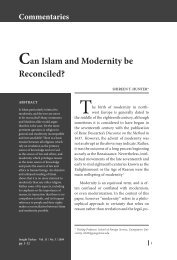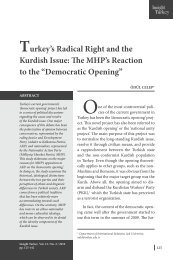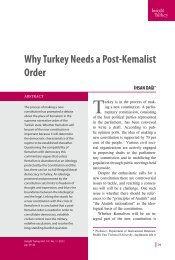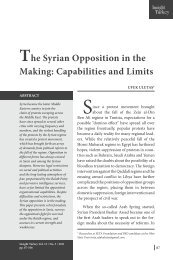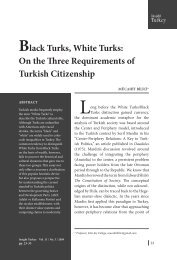Culture of Co-existence in Islam: The Turkish Case
Culture of Co-existence in Islam: The Turkish Case
Culture of Co-existence in Islam: The Turkish Case
Create successful ePaper yourself
Turn your PDF publications into a flip-book with our unique Google optimized e-Paper software.
ALİ BARDAKOĞLU<br />
Despite the advances it had made, the Ottoman Empire collapsed follow<strong>in</strong>g<br />
the Second World War. <strong>The</strong> Republic <strong>of</strong> Turkey was established on the ru<strong>in</strong>s <strong>of</strong><br />
this multiethnic and multi- religious empire. This br<strong>in</strong>gs us to the question <strong>of</strong> how<br />
far modern Turkey <strong>in</strong>herited the culture co-<strong>existence</strong> and which new <strong>in</strong>struments<br />
it developed to consolidate this culture.<br />
<strong>The</strong> Transition from Ottoman Empire to <strong>Turkish</strong> Republic<br />
<strong>The</strong> transition from a multi-ethnic and multi-religious empire to a nation state,<br />
a concept underl<strong>in</strong>ed by homogeneity, has not been an easy process. A number<br />
<strong>of</strong> social, political and economic reforms had to be <strong>in</strong>troduced to ensure public<br />
participation <strong>in</strong> the mak<strong>in</strong>g <strong>of</strong> a new nation. In the meantime, transitional conditions,<br />
stormy <strong>in</strong>ternational relations, and the war <strong>of</strong> <strong>in</strong>dependence all left their<br />
impr<strong>in</strong>ts on social memory. Modern Turkey was established as a nation state on<br />
secular foundations; Muslims and non-Muslims alike are <strong>in</strong>corporated <strong>in</strong>to the<br />
fabric <strong>of</strong> society as citizens. Today, several non-Muslim religious groups exist <strong>in</strong><br />
Turkey, most <strong>of</strong> which are concentrated <strong>in</strong> Istanbul and other large cities. S<strong>in</strong>ce<br />
census results do not conta<strong>in</strong> any data perta<strong>in</strong><strong>in</strong>g to the religious affiliation <strong>of</strong><br />
<strong>Turkish</strong> citizens, the exact membership figures for Christians, Jews and other religious<br />
groups are not available.<br />
Article thirty-n<strong>in</strong>e <strong>of</strong> the Treaty <strong>of</strong> Lausanne guarantees equality among <strong>Turkish</strong><br />
citizens regardless <strong>of</strong> their religious conviction: “<strong>Turkish</strong> nationals belong<strong>in</strong>g<br />
to non-Muslim m<strong>in</strong>orities will enjoy the same civil and political rights as Muslims.<br />
All the <strong>in</strong>habitants <strong>of</strong> Turkey, without dist<strong>in</strong>ction <strong>of</strong> religion, shall be equal<br />
before the law.” Article 40 <strong>of</strong> the Lausanne Treaty further stipulates that:<br />
<strong>Turkish</strong> nationals belong<strong>in</strong>g to non-Muslim m<strong>in</strong>orities shall enjoy the same treatment and<br />
security <strong>in</strong> law and <strong>in</strong> fact as other <strong>Turkish</strong> nationals. In particular, they shall have an equal<br />
right to establish, manage and control at their own expense, any charitable, religious and<br />
social <strong>in</strong>stitutions, any schools and other establishments for <strong>in</strong>struction and education, with<br />
the right to use their own language and to exercise their own religion freely there<strong>in</strong>.<br />
Article 42 reaffirms this proposition:<br />
<strong>The</strong> <strong>Turkish</strong> Government undertakes to grant full protection to the churches, synagogues,<br />
cemeteries, and other religious establishments <strong>of</strong> the above-mentioned m<strong>in</strong>orities. All facilities<br />
and authorization [sic] will be granted to the pious foundations, and to the religious and<br />
charitable <strong>in</strong>stitutions <strong>of</strong> the said m<strong>in</strong>orities at present exist<strong>in</strong>g <strong>in</strong> Turkey, and the <strong>Turkish</strong><br />
Government will not refuse, for the formation <strong>of</strong> new religious and charitable <strong>in</strong>stitutions,<br />
any <strong>of</strong> the necessary facilities which are guaranteed to other private <strong>in</strong>stitutions <strong>of</strong> that nature.<br />
120



